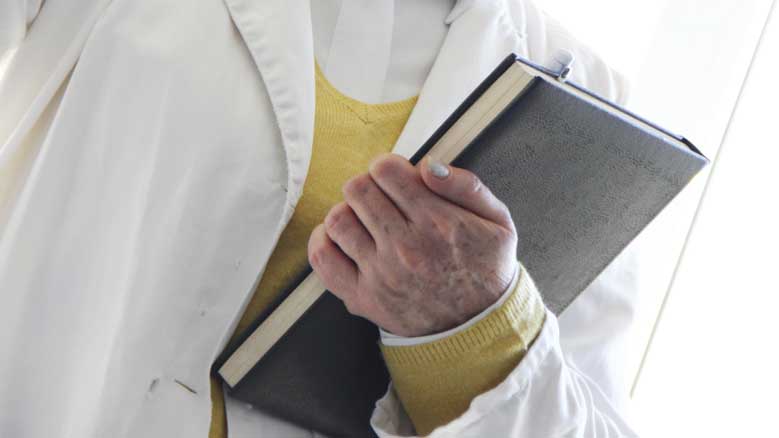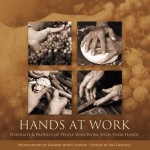
As I climb the stairs to the second floor apartment, I hear angry voices seeping into the hallway, as does the stench of cigarette smoke. My blue canvas bag, bulging with handouts about pregnancy and mother-baby interactions, digs into my shoulder. A high-pitched outburst follows my knock on the thin door.
“Turn the damn TV down, Joey. The nurse is here.”
And here I am, once again face-to-face with this 20-year-old—more girl than woman—a toddler straddling her hip. Her t-shirt strains to cover the curve of her pregnancy. She turns toward the little boy kneeling inches from the soap opera on the television screen.
“Joey, what did I just say? Turn it down!” she shouts.
Her pale blonde hair swings as she twists toward the boy, and I can see a bruise on her cheek.
My heart sinks, just the way it had the day before when her referral had shown up on my desk at the county health department. The prenatal clinic report said she was pregnant again, a third baby on the way with the same man who had fathered the first two—the same man who had sent her to the hospital more than once with bruises and broken bones. Evidently my teaching about birth control after her second baby hadn’t gotten through. Counsel about leaving this abusive relationship hadn’t helped either. I work my mouth into a smile as I enter the one-bedroom apartment. Later, I’d realize that the ache in my shoulders wasn’t just from the weight of my nursing bag.
If I had written this essay 20 years ago, fresh from the visit to the noisy apartment, my words would have burned with fervor for nursing. But today, 40 years after entering the field, my story is of the cost of that flame and of how my Quaker meeting helped me transition to work where a new spark could ignite.
For years, my husband, Jerry, and I viewed our work as a Spirit-led calling to be of service in the world. Jerry worked in public schools as a sign language interpreter; I followed leadings to nursing care in surgical intensive care, home health and hospice, maternal/child health, and public health policy. Our work was demanding, and our annual summer vacation to the remote village of Stehekin, Washington, restored our enthusiasm and drive when they flagged.
In Stehekin (a community to which no roads lead, just a ferry stop at the end of 55-mile long Lake Chelan in Washington’s North Cascades) the solitude and the slowed pace helped us re-acquaint ourselves with each other and with our dreams. The 180 million-year-old, glacier-carved peaks surrounding Stehekin reopened our hearts and minds to God’s presence. At home, that spiritual voice I strived to hear was muted too often by worries about the pregnant women and babies in my public health nursing caseload; by taxiing our twin son and daughter to school, soccer practice, the orthodontist; and by the yard, the dog, the mortgage, and the grocery bills.
Most Sundays, Jerry and I sat in silence for an hour at our Quaker meeting in the college town of Bellingham, Washington. I’d breathe in deeply and count silently to ten as I tried to empty my mind of concerns and fears, and listen for “the still, small voice.” I knew that single hour on Sunday wasn’t enough to keep me centered, but I rarely managed to squeeze out any minutes during the week to reconnect with the Spirit that I knew sustained me.
One winter, work stress dominated my worship. My first weeks as a communicable disease supervisor had been consumed by an outbreak of E. coli. With ten cases of what was then a new strain of the infection, my staff and I scrambled to keep up with directives from the state Department of Health and the Centers for Disease Control. When one of those cases—a two-year-old boy—died, we then had to calm the fears of all the families whose children attended the same childcare center.
The day after the child’s death, I walked into my office, stepped around memos and faxes I’d stacked into piles on the floor, moved mounds of paper off my chair, and sat in the early morning quiet. My schedule for staffing the immunization clinic poked out from under the previous day’s Seattle Times with the headlines of E. coli incidence around the state. Young children were on respirators and in kidney failure as a result of this infection, and I still had to make sure we had nurses to give shots to the children who’d be filling our waiting room within an hour; the boxes on the calendar were shadowed with scribbles and white-out. Grief and worry had robbed me of sleep the night before, and I didn’t know where to start.
By the time daffodils started to poke through the ground in the spring, I was exhausted. For weeks I’d juggled responding to regional and national media and a public that no longer trusted they could eat a hamburger at their favorite fast food stop, all the while keeping our immunization and refugee clinics staffed and bringing in revenue.
That summer, our ninth return to Stehekin, we rented a house for the entire month of July. Jerry’s interpreting job at a high school gave him the summer free; with a combination of holidays, personal days, and vacation days, I could take most of the month off from my nursing job. I needed the escape more than ever.
As usual, Jerry and I donned hiking boots, filled water bottles, and sought refuge on trails, this time a flat, two-and-a-half mile trek to Agnes Gorge. With only 300 feet of elevation gain, it was more of a stroll, surrounded by ponderosa pines, Douglas firs, and a small grove of aspens. Along the way, we paused for views of open hillside meadows and 8,000-foot-tall Agnes Mountain. Stepping gingerly on rocks and fallen tree limbs to cross an icy stream cutting through the trail, we inhaled slower and more deeply than we had in months. As the path re-entered the woods and got steeper, my thoughts started to roil. I couldn’t remain quiet any longer, and words tumbled out voicing frustration about my job and uncertainty about whether I was doing what I was meant to do.
A few switchbacks later, my doubts temporarily eased, Jerry and I returned to our annual daydreaming about living in Stehekin. We wondered aloud what it would be like without television or radio reception, without phones, a daily newspaper, or a grocery store. We talked of sending the kids to Stehekin’s one-room school, with classmates of all ages from kindergarten through eighth grade and with the river and the woods as their playground. Winding our way through the lush forest path, we fantasized about rising each day in the mountains and living in sync with the seasons and nature’s rhythms. But, just as every other year, by the end of the hike we talked ourselves out of it, convinced that the kids would resist, we’d miss the conveniences of home, and we’d never be able to support ourselves in a place without nursing or interpreting jobs.
A week later, though, I left Jerry and the kids in Stehekin and returned to Bellingham for a few days of work. After the two-and-a-half hour boat ride down Lake Chelan, I retrieved our car parked at a lot at the landing. I rolled down the car windows, turned on the radio, and began the three-hour drive home through ranch-land, then west on the road winding along the Wenatchee River. A couple of hours into the drive, static drowned out the music; radio signals couldn’t penetrate the ragged rock ridges approaching the ski area at Stevens Pass. In the stillness of my solitary journey, the evening air swirled in through the car window.
As the Ford’s diesel engine haltingly inched the car up toward the pass, the sun headed toward slumber, and the stars awakened. I imagined quitting my job, renting our house out, and our family making Stehekin our home for at least a year. Even as my mind raced, my heart rate quickened, and I thought to myself, this is crazy, I felt a calming presence, urging me along, stripping away obstacles. It wasn’t that I heard a booming, God-like voice speaking to me, but I sensed a wisdom there with me, opening me to a vision of how things could be. The energy compelling me seemed to be coming from a different level of awareness than my usual decision-making approach of listing pros and cons, obstacles and opportunities. That night I was feeling led as surely as the highway routing me over the mountain pass.
By the time I arrived home, I’d devised a plan. Before I went to bed, I filled two pages with ideas about taking a leave of absence, becoming a freelance nurse consultant, and advertising in Quaker circles for renters for our house. When I returned to Stehekin a week later and talked with Jerry and the kids about a family sabbatical, they were all for it.
Despite the signal I’d gotten that quiet night on Stevens Pass, I realized I didn’t fully trust it once we were back in Bellingham. Had God elbowed me to take time to listen deeply for a new direction? Or was it fatigue from the suffering I’d witnessed in my work nudging me? Was I surrendering to a source of deeper wisdom, or giving up when faced with my own inadequacies? Jerry also sensed that this move was part of a larger call to re-examine the direction of our lives, but he had doubts, too. We went to our Quaker meeting to help us test our desire.
The clearness committee is one process Friends have developed to help people discern when, or even if, the Spirit is leading them. It’s like going to your favorite aunt when you’re trying to make a decision. She nods slightly as you weigh pros and cons; she responds to your wonderings with gentle questions that unlock the answers inside you.
We’d requested a clearness committee six years earlier when we contemplated relocating from Seattle to Bellingham. We hoped a possible move to Stehekin might benefit from another round of clearness. One squally fall evening, four Quaker “aunts and uncles” joined Jerry and me in our living room. Wind off Bellingham Bay blew rain sideways across the picture window. Sue, a member of that previous committee, facilitated this one. After about 15 minutes of silent worship, Sue explained the committee’s purpose was to support us in listening for inner guidance, not to tell us what to do. She then asked us to explain the decision we were seeking clarity about. Jerry and I took turns describing our plan for a year in Stehekin.
“We feel like we’re moving too fast and spending too much time working to support a lifestyle that doesn’t nourish us,” Jerry said.
“For over 20 years, I’ve been passionate about nursing,” I said. “I‘ve approached public health with fervor, believing this was the work I was meant to do. Over the last couple of years, though, I’ve felt frustrated and discouraged.” I took a deep breath. “I don’t like being angry with my clients when they make choices that aren’t good for themselves and their children.”
I felt embarrassed by my admission, but, once asked, I couldn’t hold back my words or my tears. “And I’m so tired of the bureaucracy surrounding public health decisions. It seems it’s all about money and not what’s best for people. This isn’t how I want to feel about my work.”
I looked around the circle at Jerry and our friends. Some of them nodded; others had their eyes closed but were listening intently. Sue cleared her throat.
“What kinds of sacrifices would you have to make to do this?”
Sue’s question hung in the air as I mentally clicked off what I’d “give up” by moving to Stehekin: television, shopping malls, telephones, a grocery store open 24 hours a day just a mile away. Those were the losses people often cited when we talked about life in Stehekin, but I welcomed being free of their intrusions. As the committee waited, I thought to myself that to not follow through with the plan would have felt like a sacrifice. But that wasn’t the full answer. The silence stretched out; my heart pounded, and I swallowed hard around the lump in my throat.
“I’d have to sacrifice my identity as a nurse,” I finally answered. “That’s how I’ve presented myself to the world for over 20 years. I’ve never struggled to describe who I am as long as I’ve had that title. I think I’m being called to strip away that old image of myself, but if I give it up, who will I be?”
“What is it about moving to Stehekin that will help you discover if you’re called to other work?” someone asked.
I could answer this question without hesitation. “There’s no option of nursing work there, so people won’t see me as a nurse and won’t have expectations that I’ll keep climbing the professional ladder with more and more leadership and responsibility. And although I know I can hear God anywhere, I need the slower pace and solitude to listen.”
 That night, the clearness committee’s questions helped me answer some of my own. Throughout the following year, we met a few more times. They also helped with practical matters such as finding renters for our house and a place to store personal belongings we wouldn’t need in Stehekin. And, along with others in the Quaker meeting, they joined in on the final house and yard cleanup and sent us off with a potluck, good wishes, and a scrapbook of photos.
That night, the clearness committee’s questions helped me answer some of my own. Throughout the following year, we met a few more times. They also helped with practical matters such as finding renters for our house and a place to store personal belongings we wouldn’t need in Stehekin. And, along with others in the Quaker meeting, they joined in on the final house and yard cleanup and sent us off with a potluck, good wishes, and a scrapbook of photos.
The first summer in Stehekin, I took a job kneading dough into bread loaves at the local bakery. After it closed for the winter, I turned inward. My spiral-bound journals became an extension of our clearness committee as I filled two of them with questions. Had I failed as a nurse? Or was I being called to different work?
Our one-year sojourn turned into two. I didn’t go back to the old job or to Bellingham. My family and I moved from Stehekin to another remote (though slightly less so) community in Washington—Lopez Island—where we worship with the preparative meeting there. A decade after our relocation to the island, and with the kids on their own journeys, Jerry and I needed clearness again when we found ourselves at another crossroads about our work.
 Jerry hadn’t worked as a sign language interpreter since we’d left Bellingham for Stehekin, and with no deaf students on Lopez, he’d found employment with the county public works department. I did some independent public health consulting, but I yearned to devote more time to writing after attending a workshop at Pennsylvania’s Pendle Hill conference center led by Quaker author Tom Mullen. With encouragement from Friends on Lopez, we again sought guidance, this time as resident students for a term at Pendle Hill; we braved an East Coast winter to take the course offered by Marcelle Martin, “Discerning Our Calls.” There we studied about and practiced the clearness committee process, and both of us gained some clarity about our next steps.
Jerry hadn’t worked as a sign language interpreter since we’d left Bellingham for Stehekin, and with no deaf students on Lopez, he’d found employment with the county public works department. I did some independent public health consulting, but I yearned to devote more time to writing after attending a workshop at Pennsylvania’s Pendle Hill conference center led by Quaker author Tom Mullen. With encouragement from Friends on Lopez, we again sought guidance, this time as resident students for a term at Pendle Hill; we braved an East Coast winter to take the course offered by Marcelle Martin, “Discerning Our Calls.” There we studied about and practiced the clearness committee process, and both of us gained some clarity about our next steps.

Back home after the term, I gradually devoted increasing amounts of time to writing, and collaborated with a photographer on a book, Hands at Work—Portraits and Profiles of People Who Work with Their Hands. With that project, I experienced the joy of writing my heart out and seeing my words in print. Four years ago, when I considered applying to a program for a Master of Fine Arts in creative writing, I again requested a clearness committee to help me discern about that leading. Some of those Friends attended my graduation in August 2014 and are among the people I acknowledged in the memoir manuscript I completed while a student.
Last spring, I gave notice at the part-time school nurse job I’d held for five years. I anticipate that I won’t renew my nursing license when it comes due next May. I’m seeking still: not escape, now, but clarity about how I can serve through my writing. And, I know that whenever I need it, a clearness committee will support me in that search.



Your storytelling skills nudged me through the first half of your story, like an experienced fisherman/woman you drew me in deeper and deeper to your tale. Fighting tears, I found myself holding my breath until you found resolution. Your story, while written in another state, another set of occupations, so reflects the tone of my husband and I as we seek clarity. There is no solid Friends group in our town that we’ve found. The closest group I know of is at least an hour’s drive away in good weather. It was so refreshing when we lived there and could attend. I miss the community of a Friend’s gathering. I miss the silence and solitude you’ve found on Lopez. I pray for our own clarity of mind and soul to lead us to the best path for the greatest good. Thank you so much for sharing your personal journey.